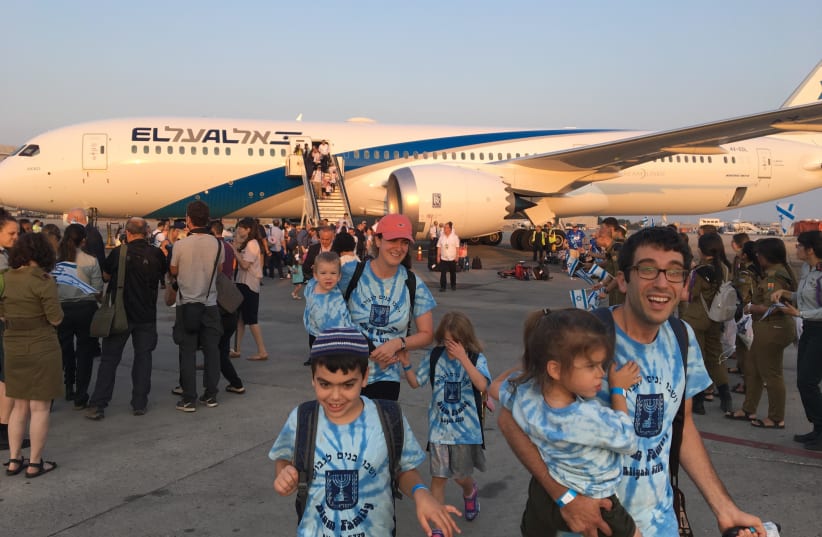Moving to Israel is not really about us, Robert Blum tells The Jerusalem Post while handing out packaged airplane meals to his five young children aboard a chartered Nefesh B’Nefesh flight that brought 242 new immigrants to the Jewish state on Wednesday.
The kids, Blum says, who range in age from one to eight years old, are the real reason behind the family’s decision to leave the country they know – where they speak the language and understand the culture – and move across the world.
The Nefesh B’Nefesh chartered flight of 242 olim that arrived in Israel on Wednesday included 103 children under the age of 17 years old, more than 40% of the total participants. The youngest was just 28 days old.
The sentiment was echoed by other parents making the move as well. “We are here for us, but we are really here for them and to have them grow up in Israel,” says Zachary Stern, who arrived with his wife, Stephanie, and their three children. “This is what it’s all about.”
Blum and his wife, Sarah, felt that their decision to move to Israel was in large part due to how child-friendly they found the country to be in comparison to where they were previously living.
“We went to Israel two years ago – we had four children at the time – for a month and rented an apartment in Jerusalem,” Blum says. “Even though we also had amazing times there as young adults, going with kids opened our eyes to how child-friendly Israel is; the culture around parenting, the feeling you get with your kids there – that they are welcomed everywhere, that people are happy to see children, that the society values children – which really means it values itself and wants to grow and flourish.”
“But you don’t always have that sense walking around the streets of big American cities or in the suburbs where even if they have children, they have fewer children,” he says.
Blum explains that he and Sarah “felt that the childhood experience in Israel would be richer and well-rounded than it would be in an American suburb, even though we liked where we were living,” he says, adding that “I would say that’s the real primary reason why we are doing this. It’s not for us.”
According to a Taub Center study published this year, Israelis have the most children on average compared to other countries that are members of the OECD. Whereas Israelis have an average of 3.1 births per woman, the next highest number of children was Mexico, with an average of almost one full child less than Israel.
To prepare the kids for the transition, Blum made sure that they would have a good command of Hebrew and explained to his older children why they are making the move.
The children had been enrolled in a school where the teachers are Israeli and taught them Hebrew, which has allowed for “the older two kids to be pretty conversant [in Hebrew] given their level and the amount of education they have had.”
Blum also says he felt the need to prepare his children “in terms of the bigger picture, obviously on their level and especially the older two in terms of why it is important to live in Israel, that Israel is our home.”
Aryeh Wasserman, who also immigrated on Wednesday with his wife and three children, similarly tried to push his young children to absorb Hebrew before the move.
“Since they were born, I’ve tried really hard to get them to understand Hebrew,” Wasserman says. He did this by speaking the language in the house and by bringing them Israeli versions of Disney movies to watch.
However, his kids, aged four months to five years old, are young enough that he believes they will quickly integrate into Israeli culture. For him, the ability to offer his children a chance to grow up speaking Hebrew as a first language opens the door for them to opportunities that he himself didn’t have.
“Despite my Hebrew being good, I’m still going to struggle because I’m not native. So as an educator, I feel like the biggest gift that I can give to my children is that they will have access from the getgo, naturally, to our heritage because they will have the language,” he says.
But, Blum says that he believes the children’s ability to adapt will also depend on their parents’ ability to make Israel feel like home.
“I actually got some advice from a veteran oleh, a psychologist, who just had his first grandchild in Israel,” Blum explains. “He said not to worry about the kids so much, that they will adjust very quickly. But you should make sure you have the same nice home atmosphere you had in America, you should try to recreate that and to do that, you really need to worry more about yourself, the adults, because the move is harder for you. There is more on your shoulders and the transitions are harder because you’re used to a way of doing things.”
If the adults feel comfortable in Israel, Blum says calmly as his five children happily munch on their airplane meals, so will the children.
